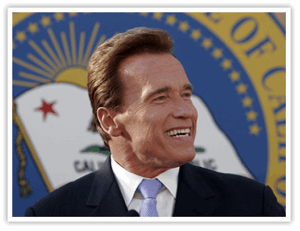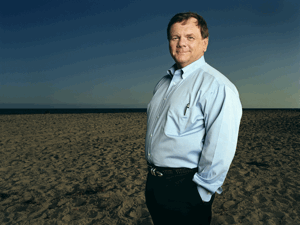California’s Climate Law on the Ballot
Air Date: Week of October 15, 2010

Terry Tamminen was Governor Schwarzenegger’s secretary of the California Environmental Protection Agency. (Photo: Terry Tamminen)
This November, California voters will decide whether or not to rollback the state’s plan to reduce climate change emissions. Terry Tamminen is the former secretary of the state’s Environmental Protection Agency and the founder of Seventh Generation Advisors. He tells host Bruce Gellerman what’s at stake both economically and environmentally in next month’s election.
Transcript
GELLERMAN: From the Jennifer and Ted Stanley Studios in Somerville, Massachusetts, this is Living on Earth. I’m Bruce Gellerman. California has the seventh largest economy in the world. So four years ago, when the state adopted an ambitious plan to reduce greenhouse gas emissions, the world took notice. Now that plan, officially known as Assembly Bill 32, could be history even before it’s implemented. Opponents say the bill will stall California’s already stale economy and have placed Proposition 23 on the ballot this November. Prop. 23 would roll back AB 32. Terry Tamminen was Governor Arnold Schwartzenegger’s secretary of Environmental Protection when AB 32 passed. Today, he’s head of Seventh Generation Advisers, a climate change consulting firm. Mr. Tamminen, welcome to Living on Earth.
TAMMINEN: Thanks for inviting me.
GELLERMAN: So, for those of us not familiar with California’s climate laws, what exactly is Assembly Bill 32?
TAMMINEN: AB 32, as it’s called, also known as the global warming solutions act- a pretty lofty title- was designed and passed in 2006 to help California do our fair share to reduce greenhouse gas emissions, modernize the economy with clean energy and energy efficiency and low carbon economic development.
GELLERMAN: So now comes Proposition 23, it’s the ballot initiative, which is up to voters in California this November. And, it would basically, as I understand it, not kill Assembly Bill 32, but roll it back. Is that right?
TAMMINEN: That’s right. I mean it effectively does kill it because it says that it could not be implemented until unemployment reaches very low levels. And that just puts a lot of uncertainty into the process, which currently is on a path to quite a bit of certainty.
GELLERMAN: Supporters of Prop. 23, which would roll back 32, have a very well financed campaign.
TAMMINEN: There’s no question that the proponents of Prop. 23 are well financed. And, in some ways it’s being financed by you and me, because we know that it’s mostly from three major oil companies from out of state- one Oklahoma, two from Texas- that have bankrolled this with millions and millions of dollars. And I say that money comes from you and me because every time we fill up our cars we are supporting the oil industry that is effectively turned back the clock a hundred years on technology and California’s economic future.
GELLERMAN: So would there be international implications if Californians voted to roll back AB 32?
TAMMINEN: You know, California has a history of being a leader on environmental policy, whether it was being the first to have a clean air act, or a clean water act. The U.S. Congress then typically follows, and then often the rest of the world does. And, although Europe was ahead of us on climate change policy, China, which is the other big emitter along with the U.S. that so far has no major regulations, is kind of waiting. And, if the U.S. doesn’t act and realize that the rest of the world is not going to come up with a comprehensive solution to this problem- so if California can’t do it, this great leader on environmental technology and policy, if California can’t do it, you can imagine that Congress would pretty much stall any action and therefore the U.S. is not going to be part of the solution.
GELLERMAN: So as goes California, so goes the United States?

California’s Republican Governor, Arnold Schwarzenegger has been a supporter of the state’s climate bill. (California Office of the Governor)
TAMMINEN: Exactly. And, therefore, unfortunately, so goes the world. You know, California has acted like a nation state, especially under Governor Schwarzenegger, and has reached out and signed agreements with provinces in China, with states in Brazil to deal with deforestation, with countries in Europe, with provinces up in Canada and so on, because we realize that there’s a real need to share policies, to share technologies, to figure out how to do these things together. And it’s something the world understands, and is still struggling with. So, California could still certainly still honor those commitments, but really what’s harmed is those economic developments that is likely to be coming with them.
GELLERMAN: That economic development would be done by companies. How would Proposition 23 affect the investment in clean technologies?
TAMMINEN: Well, if Prop. 23 passes, and effectively ends the implementation of AB 32, then the price on carbon doesn’t occur, there isn’t a market place for carbon emissions where creative businesses can figure out how to reduce faster than others and then trade credits to one another. The whole concept of a cap and trade is to bring down emissions but allow business the most creative and cost effective ways to achieve it.

Terry Tamminen was Governor Schwarzenegger’s secretary of the California Environmental Protection Agency. (Photo: Terry Tamminen)
And so, for example, the deal that California struck with Brazil to allow carbon credits to be created that could be traded into California and Western states market place for well managed forests that have proved they’ve reduced greenhouse gas emissions by forestry practices- those credits could be traded to a company in California that has an obligation to reduce that hasn’t been able to do so yet- they could buy those credits from Brazil. That entire marketplace goes away and that entire economic driver for economic development on both ends of the equations- goes away.
GELLERMAN: If Proposition 23 were to pass, would California still be able to move forward on some clean energy fronts?
TAMMINEN: Well, certainly, I mean California has been a leader in solar before the passage of AB 32, we passed our own million solar roofs initiative under Governor Schwarzenegger, for example. And, we have our renewable portfolio standard, which is helping utilities to make California much greener in terms of the electricity that they deliver to customers. We have our tailpipe emissions standards from clean cars; those standards were adopted by the Obama administration as national standards.
So, there’s a variety of measures in place, that with our without AB 32 would move forward, but, again, it creates a time of uncertainty which businesses would always come to me when I was in government and say, ‘The one thing we want is certainty. We can deal with a little more cost or you know, some other way of doing business- we just want certainty so we can plan.’ And, Prop. 23 is entirely going in the wrong direction.
GELLERMAN: Terry Tamminen is founder of Seventh Generation Advisors, his latest and soon to be released book is “Cracking the Carbon Code.” Mr. Tamminen, thank you very much.
TAMMINEN: My pleasure, thanks for asking.
Links
Click Here for More Information on AB 32
Living on Earth wants to hear from you!
Living on Earth
62 Calef Highway, Suite 212
Lee, NH 03861
Telephone: 617-287-4121
E-mail: comments@loe.org
Newsletter [Click here]
Donate to Living on Earth!
Living on Earth is an independent media program and relies entirely on contributions from listeners and institutions supporting public service. Please donate now to preserve an independent environmental voice.
NewsletterLiving on Earth offers a weekly delivery of the show's rundown to your mailbox. Sign up for our newsletter today!
 Sailors For The Sea: Be the change you want to sea.
Sailors For The Sea: Be the change you want to sea.
 The Grantham Foundation for the Protection of the Environment: Committed to protecting and improving the health of the global environment.
The Grantham Foundation for the Protection of the Environment: Committed to protecting and improving the health of the global environment.
 Contribute to Living on Earth and receive, as our gift to you, an archival print of one of Mark Seth Lender's extraordinary wildlife photographs. Follow the link to see Mark's current collection of photographs.
Contribute to Living on Earth and receive, as our gift to you, an archival print of one of Mark Seth Lender's extraordinary wildlife photographs. Follow the link to see Mark's current collection of photographs.
 Buy a signed copy of Mark Seth Lender's book Smeagull the Seagull & support Living on Earth
Buy a signed copy of Mark Seth Lender's book Smeagull the Seagull & support Living on Earth

